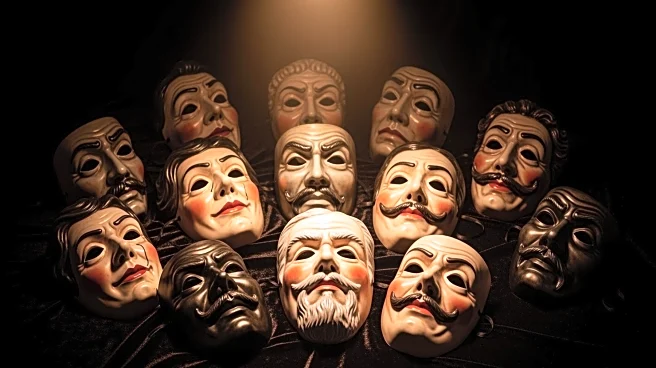What's Happening?
Marissa Bode, known for her role as Nessarose in the movie musical Wicked, is advocating for more inclusive casting in Hollywood. As the first wheelchair user to portray the character, Bode is using her platform
to push for roles that do not focus solely on disability. She believes that art often imitates life, and by showcasing disabled individuals in everyday roles, society will begin to treat them as equals and provide the equity they deserve. Bode's advocacy comes ahead of the release of Wicked: For Good, the sequel to the original film, which is set to hit theaters on November 21. Her efforts are part of a broader movement among disabled actors to change the narrative in Hollywood and promote diversity and inclusion.
Why It's Important?
Bode's advocacy for inclusive casting is significant as it challenges the traditional narratives in Hollywood that often marginalize disabled individuals. By promoting roles that do not focus on disability, Bode is helping to shift societal perceptions and encourage equal treatment. This movement has the potential to impact the entertainment industry by broadening the scope of stories told and increasing representation for disabled actors. It also highlights the importance of diversity and inclusion in media, which can influence public attitudes and foster a more equitable society. As more actors join this cause, it could lead to systemic changes in casting practices and greater opportunities for disabled individuals in the industry.
What's Next?
With the upcoming release of Wicked: For Good, Bode's advocacy is likely to gain more attention. The film's success could further amplify her message and encourage other actors and filmmakers to consider more inclusive casting practices. Additionally, as discussions around diversity and representation continue to grow, industry leaders may face increased pressure to implement changes that reflect these values. Bode's efforts could inspire other disabled actors to speak out and advocate for similar changes, potentially leading to a broader movement within Hollywood. The response from audiences and critics to the film and Bode's role may also influence future casting decisions and the types of stories that are prioritized in the industry.
Beyond the Headlines
Bode's advocacy touches on deeper cultural and ethical dimensions, challenging the entertainment industry to rethink its approach to storytelling and representation. By advocating for roles that do not focus on disability, Bode is pushing for a cultural shift that recognizes the diverse experiences and identities of disabled individuals. This movement raises important questions about the ethical responsibilities of filmmakers and the impact of media on societal attitudes. It also highlights the need for long-term changes in how stories are crafted and who gets to tell them, potentially leading to a more inclusive and representative media landscape.










